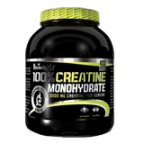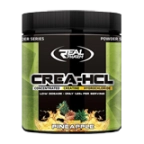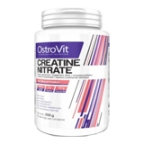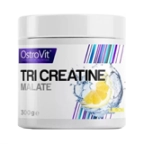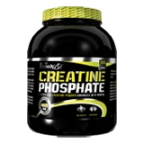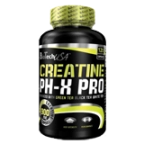-
 Stark Pharm Pre-Workout - Stark 3D+ (D-MAA & PUMP) (300 grams) (30 servings)
Stark Pharm Pre-Workout - Stark 3D+ (D-MAA & PUMP) (300 grams) (30 servings)Stark 3D+ DMAA & PUMP is a blend...
536 грн 670 грн
Creatine
- 2345
Creatine monohydrate Stark Pharm - Stark Creatine Monohydrate Powder




 5 Review(s)
5 Review(s) The powdered form of creatine monohydrate is a sports drug that helps increase strength endurance and increase strength characteristics.
310 грн - 61495
Creatine AllNutrition - Creatine Muscle Max
AllNutrition - Creatine Muscle Max is based on micronized creatine monohydrate supplemented with taurine.
593 грн - 2432
Creatine Olimp Labs - Creatine Monohydrate Powder
Olimp Labs Creatine Monohydrate Powder is the most popular nutritional supplement among athletes of all disciplines, from sprinters to bodybuilders.
694 грн - 2115
Creatine BioTech - CreaTor (120 capsules)
The latest, specially designed formula that takes into account all the needs of modern athletes.
888 грн - 2348
Creatine Myprotein - Creatine Monohydrate (250 tablets)
Food supplement Myprotein - Creatine Mohonydrate - creatine monohydrate in the form of unflavored tablets.
725 грн - 1238
Creatine BioTech - Creatine pH-X (90 capsules)
The food supplement BioTech - Creatine pH-X contains a buffered form of creatine monohydrate.
945 грн - 65841
Creatine BioTech - Creatine Zero 2500 mg (18 tablets)
Food supplement BioTech - Creatine Zero contains creatine in the form of effervescent soluble tablets.
235 грн - 5681
Creatine BioTech - Tri-Creatine Malate (300 grams)
Tri-Creatine Malate is a working product with which you can significantly increase strength, endurance and increase muscle mass in a short time.
999 грн - 2670
Creatine Bodyperson Labs - Creatine Monohydrate (500 grams)
Bodyperson Labs - Creatine Monohydrate contains the highest grade pure creatine monohydrate with pharmaceutical grade micronization.
501 грн - 1810
Performance Creatine San 300 grams
Creatine promotes better recovery of muscle tissue after exercise.
274 грн - 1596
Creatine Scitec Nutrition - 100% Pure Creatine
Scitec Nutrition's 100% Pure Creatine supplement contains pure, unflavored creatine monohydrate to improve training performance and overall health.
436 грн - 1246
Creatine BioTech USA - 100% Creatine Monohydrate
100% Creatine Monohydrate from BioTech USA activates metabolic processes, which are expressed in increasing the athlete's endurance, anabolism and improving energy metabolism.
860 грн
What is creatine?
Creatine is an organic compound ( 2-(methylguanidino)-ethanoic acid ), which is usually found in the muscle tissue of humans and other animals, is produced by the body in the process of biosynthesis, which takes place in the kidneys, liver and pancreas, from three amino acids (arginine, glycine, methionine). The basic process of creatine biosynthesis involves several chemical reactions in which these amino acids are combined to form creatine. Arginine and glycine combine to form guanidine aminoacetic acid (GAUA), which is converted to creatine in the presence of methionine.
Where to get creatine?
In addition to internal synthesis, creatine also enters the body through diet. The main sources of creatine from food are meat, fish and poultry. These foods contain creatine in large quantities. But in order not to overload the stomach, it is better to take creatine in the form of food supplements.
How does creatine work?
Creatine is transported to muscles and other tissues, where it is used to synthesize phosphocreatine and can be rapidly released to provide energy to the muscles during short, intense physical efforts, playing an important role in providing energy to the muscles during exercise.
Why do you need creatine?
Creatine has a number of main beneficial properties for athletes, such as increasing performance, increasing muscle mass, increasing strength, reducing fatigue, improving recovery, and maintaining overall health.
Productivity improvement
Helps increase phosphocreatine levels in the muscles, which can increase the rate of energy recovery and provide additional energy for short, intense physical efforts such as lifting heavy weights, speed runs and strength training.
Increase in strength indicators
Helps to increase strength, which makes creatine useful for people involved in strength sports.
Reduction of fatigue
Helps reduce fatigue and increase endurance, allowing you to perform more repetitions and train longer.
Improved recovery
Promotes rapid recovery of muscles after intense physical efforts, helping athletes to train more often and more effectively.
Support of general health
Creatine is a safe dietary supplement that may have general health benefits, including supporting muscle and energy metabolism, improving metabolic health and immunity.
In addition to sports and physical benefits, creatine also has other potential benefits and applications in neurological diseases, to support the cardiovascular system, to reduce the loss of muscle mass in diseases.
Neurological diseases
Some studies indicate a possible benefit of creatine in patients with neurological diseases such as Parkinson's disease and Huntington's disease. Creatine has a protective effect on neurons and improves the mental state of patients.
Support of the cardiovascular system
Improves heart function and supports vascular health. Useful for patients with heart failure, coronary heart disease.
Reduction of muscle mass loss in diseases
In patients with diseases that lead to a decrease in muscle mass (cancer patients, with cachexia syndrome), creatine can help preserve muscles and improve quality of life.
Who needs creatine as a supplement?
Creatine as an additional food supplement can be useful for different groups of people, especially those who are involved in physical activity, sports or simply want to improve their health.
Groups that can benefit from creatine include athletes, athletes, bodybuilders, fitness enthusiasts, people involved in intense sports, recovering from injuries or surgery, and the elderly.
Sportsmen and athletes
Creatine improves muscle endurance and increases strength, which helps improve performance during training and competition.
Bodybuilders
Creatine helps increase muscle mass and volume, which makes it popular among bodybuilders.
Fitness enthusiasts
People who are involved in fitness and training in the gym can use creatine to improve their results and reach their fitness goals faster.
People who do intense sports
Creatine helps during intense sports that require short-term explosive energy (football, basketball, hockey, tennis, running, etc.).
People recovering from injuries or surgery
Creatine helps restore muscle function after injuries or operations.
Elderly
Creatine helps maintain muscle mass and function in the elderly, which is important for preventing muscle loss and maintaining mobility.
How and when to take creatine?
Creatine is usually taken in the form of a powder that dissolves in water. Since large doses of creatine and loading phases are recognized as ineffective and unprofitable, it is usually recommended to take 3-5 grams of creatine per day, before or after training. According to one's own desire and needs, the dosage can be increased.
Additional tips for using creatine
Consult your doctor
If you have a medical condition or are taking other medications, consult your doctor before taking creatine.
Periodization
Creatine can be taken in cycles, for example, take it for 8-12 weeks and then take a break.
Balanced nutrition
It is important to continue to eat well and drink enough water while taking creatine.
Training
Creatine will help improve your performance in the gym, but it's important to attend training regularly and do the exercises correctly.
Proven form of creatine
Choose the form of creatine that works best for you. Creatine monohydrate is the most researched and effective form of creatine.
Carbohydrates
Creatine is best absorbed by the body together with carbohydrates, so it is useful to take it together with carbohydrates or protein after training.
Side effects
Some people may experience side effects from taking some forms of creatine (bloating, diarrhea, stomach discomfort, etc.). If you notice these symptoms, stop taking creatine and consult your doctor.
Watch the results
Keep a log of your workouts and results to track whether creatine is helping you reach your goals.
Constantly update your knowledge. Remember that scientific research is constantly evolving and recommendations may change over time. Stay tuned for new research and expert advice.
Try everything
To choose the most effective form of creatine for you, try everything, then you will understand what suits you best.
It is always best to speak with a sports professional or doctor before starting any new doping or supplement regimen, including creatine.
What are the forms of creatine and what are their advantages?
Creatine exists in many forms, but the most popular and researched are creatine monohydrate, creatine hydrochloride, creatine alpha-ketoglutarate, creatine ether, creatine malate, and creatine citrate.
Creatine monohydrate
This is the most common and most researched form of creatine. It consists of creatine and molecular water. Creatine monohydrate is considered the most effective and most researched source of creatine.
Creatine hydrochloride (creatine HC L )
This form of creatine includes a hydrochloride molecule that helps increase the solubility of the creatine and may be beneficial for those with gastrointestinal issues when consuming creatine monohydrate. Creatine hydrochloride can be used in smaller doses compared to other forms of creatine, which makes it more convenient to take. Some studies indicate that creatine hydrochloride is more effective than other forms of creatine in achieving athletic performance.
Creatine alpha-ketoglutarate (creatine AK G )
This form of creatine contains the alpha-ketoglutarate molecule, which facilitates the absorption of creatine by the body. Creatine alpha-ketoglutarate has higher stability compared to creatine monohydrate, which can help reduce the breakdown of creatine during transport to the muscles and preserve more active creatine for use. It is less soluble in water compared to creatine monohydrate. One of the side effects of creatine monohydrate is possible water retention in the body. Creatine alpha-ketoglutarate is less bound to water, which allows athletes to avoid excessive swelling and flooding.
Creatine Ester (creatine Ethyl Ester )
This form of creatine includes an ester molecule that helps increase the stability of the creatine. It has a lower tendency to break down compared to creatine monohydrate during transport to the muscles, which can help preserve more active creatine for use. Creatine ether is more convenient to take due to the smaller volume of the portion and the lack of need for large doses. Has fewer side effects compared to creatine monohydrate. Convenient when mixing with various drinks, as it dissolves better in liquid.
Creatine malate ( Crea - Malate )
This form of creatine contains a malate molecule (malic acid, malic acid), which increases the efficiency of creatine transport into cells. Depending on the number of creatine molecules attached to malate, tricreatine (three creatine molecules) and dicreatine (two molecules) are separated. It dissolves well in liquid, has fewer side effects than creatine monohydrate, and can be taken in smaller doses.
Creatine Citrate
One form of creatine in which the creatine molecule is linked to a citrate molecule (an acid found in citrus fruits). Creatine citrate is more soluble and less irritating to the stomach compared to other forms of creatine. Like creatine monohydrate, it promotes water retention in the muscles, which leads to an increase in muscle volume and an improvement in their appearance.
What is creatine made from?
For the production of creatine monohydrate, chemical synthesis is used or it is extracted from natural sources.
Creatine from natural sources
Creatine can be obtained from natural sources such as meat and fish. This process includes extraction of raw material, further processing and purification to obtain creatine. The product obtained from natural sources is used to create sports supplements.
Synthetic creatine
Most of the creatine used in sports supplements is produced by chemical synthesis from raw materials such as sarcosine (a derivative of the amino acid arginine), aminocyclopentanoic acid cyanamide, and other chemical reagents. This synthetic creatine then goes through a series of purification and concentration steps to produce a pure product for use in supplements.
In addition to creatine monohydrate, there are other forms such as creatine ethyl ether, creatine citrate, creatine malate and others. These forms can be created by chemical synthesis or modifications of existing creatine.
It is important to note that regardless of the source of manufacture, if the product meets quality and safety standards, then it can be safe and effective for consumption as a sports supplement. However, consumers should monitor quality and trust manufacturers who have a good reputation and meet quality control requirements.
Creatine shelf life?
Creatine has a long shelf life, especially when properly stored. It can be kept at room temperature, in a dry place, away from direct sunlight and moisture. If you follow these recommendations, creatine can be stored for several years. However, it is important to check the expiration date, which is usually indicated on the creatine packaging. If the expiration date has passed, it is better not to use this product and buy a new one. Storing creatine according to the manufacturer's recommendations is important to ensure its effectiveness and safety.
Are there any side effects of using creatine?
Creatine is one of the most researched and safe sports supplements known for its effectiveness and lack of serious side effects in most cases. But there is a possibility of some individual side effects:
- bloating, diarrhea (in people with gastrointestinal problems);
- hydration (high doses of creatine, especially when taken without adequate water intake, can put extra strain on the kidneys and cause some hydration problems, so it's important to drink plenty of fluids while using creatine);
- weight gain (due to fluid retention in the body, as creatine stores water in the muscles);
- allergic reactions (individual intolerance);
It is important to consult your doctor before taking any supplements, including creatine, especially if you have a medical condition or are taking other medications. It is important to follow the recommendations for dosage and intake, which are indicated on the product packaging or recommended by specialists in the field of sports or medicine.
Brief description (main)
Creatine is a nitrogen-containing class of functional carboxyl groups. It plays the most important role in the energy exchange of myofibrils.
Note to all supporters of a negative attitude towards sports nutrition: E.I. Chazov discovered the most important role of creatine in the human body. In 1973, on November 6, a well-known Soviet scientist, while studying the molecular mechanism of the contractility of the cardiovascular system in ischemic disease, made a conclusion that contradicts the ideas of the masses: creatine is one of the regulators of the force of contraction of the heart.
Creatine plays the most important role in natural bodybuilding, and especially in professional bodybuilding. At the moment, it is the most effective supplement among the leaders of sports nutrition . At the same time, the cost of creatine will please even visitors to a general education institution. Myths about the harm of creatine have been repeatedly disproved, and the absence of any side effects confirms this fact.
In strength sports, creatine is used to increase strength and speed-strength indicators. At the same time, most athletes note an increase in strength endurance. On average, the number of repetitions in the bench press with weight increases by 4 times. Such an indicator does not give a chance for super compensation to delay its arrival. With an increase in strength will come an increase in mass. However, creatine by itself allows you to gain a couple of kilograms when drinking plenty of water - it "fills up". After the end of the course, the water goes away, but the power indicators remain! It's hard to believe, but unlike steroid drugs, the strength indicators remain.
Unfortunately, due to the individual characteristics of the body, creatine is not absorbed by everyone. It is estimated that about 2 out of 10 people do not experience its effects. This is due to the peculiarities of metabolic processes. But the result is absent only when taking creatine monohydrate . Manufacturers of sports nutrition have created many forms of creatine, including: hydrochloride , tartrate, phosphate, tricreatine malate and others, but the forms listed above are most suitable for strength athletes. When in doubt, you can buy creatine, which includes a complex of several types.
The popular opinion about the need for a loading phase is correct. It should be remembered that the loading period is often suitable only for creatine monohydrate, for most forms of quite ordinary dosages.
The effect of creatine is as follows: when it enters the digestive tract, it practically does not break down. In the case of creatine monohydrate, after 4 hours there is deposition in the muscles, then during physical exertion creatine reveals its functions.
Where to buy creatine?
You can buy creatine monohydrate, creatine malate, creatine citrate, creatine hydrochloride at the best prices in our store with delivery throughout Kyiv and throughout Ukraine, and also use the stores if you want to talk to our consultants.

